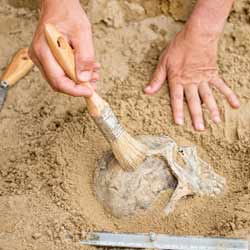Archaeology Field Schools
Archaeological field school is generally the first place that an aspiring archaeologist gets hands-on training in the basics of the profession. As the most fundamental level of archaeological training, the successful completion of an accredited field school is almost always a prerequisite for employment in the archaeological field. Thus, it is an absolutely critical step toward setting in motion you career as a professional archaeologist.
Archaeological field school is a hands-on course meant to train aspiring archaeologists in such basic field techniques as:

Although most schools are intended for undergraduate or graduate students in the discipline, anyone interested in archaeology may join a program.
Where can you attend field school? The answer is easy. There are literally hundreds of field schools dispersed across the globe in which you may choose to participate. From Peru to Sicily and China to the United States, the options are seemingly endless.
Which one should you choose? That answer is not so easy. But as a general guide, an aspiring archaeologist should keep in mind at least the following five factors when choosing a field school:
- Cost: Calculating the cost of field school can be tricky at times. Most field schools charge a program fee of approximately $3500 to $4500. The trick is to understand what is included in the fee. Does the fee include college credits toward your degree? If you’re attending field school away from home, whether in the United States or abroad, does it include meals, accommodations, travel expenses, insurance, etc? Make sure that you understand exactly what you are paying for.
- Academic Credit: Most field schools are run through accredited colleges and universities and are credited toward a student’s degree just like any other class. If you would like to attend a field school that is not directly run through a college or university, be sure to contact the program director in order to arrange for proper credit transfer.
- Research Interests: In what area of archaeology are you most interested? Perhaps you are interested in technical archaeology using such tools as GIS (geographic information systems) and geophysical remote sensing technologies. Perhaps bioarchaeology or rock art preservation is more up your alley. Try to find a field school that best suits your archaeological interests in order to make the most of your time and money.
- Location: Although archaeological methods can vary from region to region, for the most part they are systematic across the world. Therefore, all programs can train you in fundamental field techniques. While keeping cost, college credit, and research interests in mind, try to choose a field school location that is of greatest interest to you.
- Level of Practical Training: This is perhaps the most important factor to consider when choosing a field school. Although you may find a field school that focuses on your research interests in an ideal location, and may count toward your college degree at a reasonable cost, how much practical training will you really be getting out of the experience? In other words, will you be spending most of your time watching others and listening to lectures, or will you be getting hands-on training in excavation, artifact identification, and lab research? In order to get the most out of your field school, do plenty of background research on the program and contact the program director regarding your level of participation in the research.


 Teach English in Asia
Teach English in Asia  Cruise Ship Jobs
Cruise Ship Jobs  Alaska Fishing Industry Jobs
Alaska Fishing Industry Jobs  Sharing Economy / Gig Economy
Sharing Economy / Gig Economy